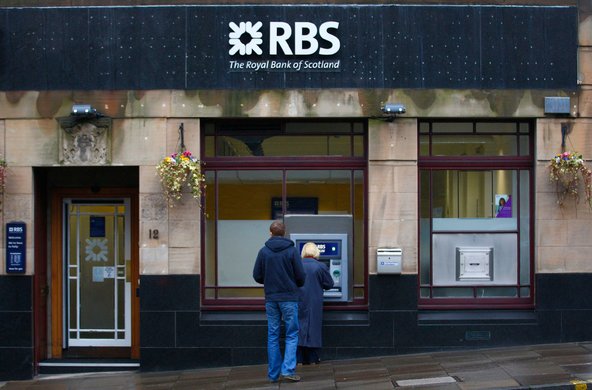 David Moir/ReutersA branch of the Royal Bank of Scotland in Edinburgh.
David Moir/ReutersA branch of the Royal Bank of Scotland in Edinburgh.
LONDON – The Royal Bank of Scotland on Wednesday struck a combined $612 million settlement with American and British authorities over accusations that it manipulated interest rates, the latest case to emerge from a broad international investigation.
In an embarrassing blow to the bank, its Japanese subsidiary also pleaded guilty to criminal wrongdoing in its settlement with the Justice Department. The R.B.S. subsidiary, a hub of rate-rigging activity, agreed to a single count of felony wire fraud to settle the case.
The settlement reflects the Justice Department’s renewed vigor for punishing banks ensnared in the rate manipulation case. In December, a Japanese subsidiary of UBS pleaded guilty to felony wire fraud as part of a larger settlement, representing the first unit of a big bank to agree to criminal charges in more than a decade.
As authorities built the R.B.S. case, they seized on a series of incriminating yet colorful e-mails that highlighted an effort to influence the rate-setting process, a plot that spanned multiple currencies and countries from 2006 to 2010. One senior trader expressed disbelief at reaping lucrative profits from the scheme, saying “it’s just amazing” how rate “fixing can make you that much money,” according to the government’s complaint. Another trader, after pressuring a colleague to submit a certain rate, offered a reward of sorts: “I would come over there and make love to you.”
In a statement on Wednesday, the American regulator leading the case slammed the bank for manipulating benchmarks like the London Interbank Offered Rate, or Libor. The regulator, the Commodity Futures Trading Commission, noted that R.B.S. employees “aided and abetted” other banks in the rate-rigging scheme and continued to run afoul of the law, though more covertly, even after learning of a federal investigation.
“The public is deprived of an honest benchmark interest rate when a group of traders sits around a desk for years falsely spinning their bank’s Libor submissions, trying to manufacture winning trades. That’s what happened at R.B.S.,” David Meister, the enforcement director of the commission, said in the statement.
Libor Explained
The settlement represents the latest setback for Royal Bank of Scotland, which has struggled to shake the legacy of the 2008 financial crisis. The British firm already has put aside $2.7 billion to compensate customers who were inappropriately sold loan insurance over recent years. On Jan. 31, British regulators also called on the bank and other local rivals to review the sale of interest-rate hedging products after more than 90 percent of a sample were found to have been sold improperly.
The broader rate-rigging case has centered on how much the Royal Bank of Scotland and a dozen other banks, including Citigroup and HSBC, charge each other for loans. Such benchmarks, including Libor, help determine the borrowing costs for trillions of dollars in financial products like corporate loans, mortgages and credit cards.
But the Royal Bank of Scotland, like many of its competitors, corrupted the process. Government complaints filed over the last year outlined a scheme in which banks reported false rates to lift trading profits and deflect concerns about their health during the crisis.
Authorities filed the first Libor case in June, extracting a $450 million settlement with the British bank Barclays. In December, UBS agreed to a record $1.5 billion settlement with European regulators, the Justice Department and the American regulator that opened the case, the Commodity Futures Trading Commission. The Justice Department’s criminal division, which secured the guilty plea from the bank’s Japanese unit, also filed criminal charges against two former UBS traders.
Some of the world’s largest financial institutions remain caught in the cross hairs of the case. Deutsche Bank has set aside an undisclosed amount to cover potential penalties.
While foreign banks have received the brunt of the scrutiny to date, an American institution could be among the next to settle. Citigroup and JPMorgan Chase are under investigation.
The Royal Bank of Scotland case represents the second-largest fine levied in the multiyear investigation into rate manipulation.
The Justice Department imposed a $150 million fine as part of a deferred-prosecution agreement with R.B.S., while the trading commission’s financial penalty reached $325 million. The Financial Services Authority, the British regulator, also levied a £87.5 million ($137 million) fine against the firm, one of the largest financial penalties ever from British authorities.
R.B.S., based in Edinburgh, had aimed to avert the guilty plea for its Japanese subsidiary. But the Justice Department’s criminal division declined to back down, and the bank had little leverage to push back. If it had balked at a plea deal, the Justice Department could have moved to indict the subsidiary.
“Like with Barclays and UBS, the settlement with R.B.S. is much more than a slap on the wrist,” said Bart Chilton, a commissioner at the trading commission who is a critic of soft fines on big banks.
In the wake of the settlement, Royal Bank of Scotland is shaking up its management team as it moves to repair its bruised image. John Hourican, the firm’s investment banking chief, resigned on Wednesday, and agreed to forgo some of his past compensation.
Royal Bank of Scotland, in which the government holds an 82 percent stake after providing a $73 billion bailout in 2008, also plans to claw back bonuses totaling $471 million to help pay for the rate-rigging penalty.
“We condemn the behavior of the individuals who sought to influence some Libor currency settings at our bank from 2006 to 2010. There is no place at R.B.S. for such behavior,” Stephen Hester, the bank’s chief executive, said in a statement on Wednesday. “Libor manipulation is an extreme example of a selfish and self-serving culture that took hold in parts of the banking industry during the financial boom.”
Article source: http://dealbook.nytimes.com/2013/02/06/as-unit-pleads-guilty-r-b-s-pays-612-million-over-rate-rigging/?partner=rss&emc=rss
Speak Your Mind
You must be logged in to post a comment.